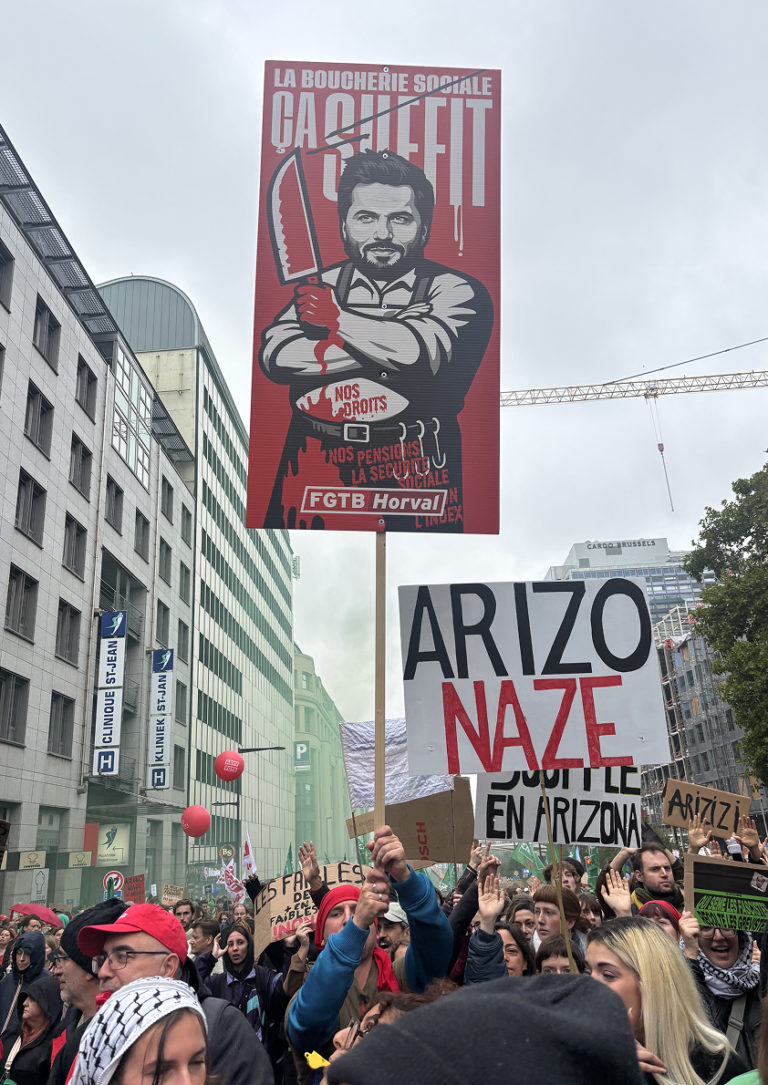Author: Manon Moulin
Belgium’s prolonged political crisis is seriously threatening its cultural scene, as well as its independent component. The deadlock in Brussels has resulted in frozen budgets and delayed payments, leaving cultural organisations and artists without essential subsidies and support, especially in the absence of a functioning regional government. These issues are compounded by austerity and federal budget cuts, creating widespread uncertainty and hardship throughout the country. The consequences are felt everywhere: in bankrupt associations, shrinking programmes, and rising social tensions. Yet, despite mounting exhaustion and frustration, unions and cultural workers remain at the forefront of strikes and protests, underscoring their commitment to defending culture as a public good and their role in demanding wider social justice.

Magma – © Melissa Fauve
“Oof. Belgian politics. In one word, we would characterise it as a mess,” says Nathanaël Havez, founder of the Brussels-based Tempest of Noise artists agency, which operates throughout Belgium. Over the past decade or so, the country has gained a reputation for setting records for forming national or regional governments: 541 days in 2010-11, 652 days in 2018-20, 239 days in 2024-25, and 500+ days and counting for the Brussels regional government.
These delays stem from a highly complex political system and have serious consequences for the economic, social, and cultural organisation of Belgium.
Federal and Regional Systemic Crisis Since 2024
On June 9th, 2024, most EU citizens went to the polls to vote in the European Parliamentary Elections. Belgians also voted for their federal and regional representatives on the same day. Busy day.
On the one hand, the Belgian federal elections aim to elect the 150 members of the Chamber of Representatives using proportional representation. The regional elections, on the other hand, elect members of the five regional and community parliaments, e.g. the Flemish Parliament, the Walloon Parliament, the Brussels Parliament, and the Parliament of the German-speaking Community.
In the 2024 elections, the country generally drifted to the right, with conservative parties dominating all parliaments. This came as a significant surprise, particularly to the Walloon and Brussels regional parliaments, which have been dominated by left-wing parties for several years. This caused problems, starting with the basics of forming a government at both the federal and regional levels.
Federal government negotiations finally succeeded in February 2025 with the appointment of Bart De Wever, leader of the nationalist New Flemish Alliance party, which defends the transformation of Belgium into a confederal state (e.g. Flanders becoming an independent state). De Wever joined the so-called Arizona coalition alongside the liberal Walloon MR party, the Flemish socialists Vooruit, as well as the Flemish and Walloon Christian Democrats from CD&V and Les Engagés.
Meanwhile, all the regions succeeded in forming their coalitions, while the Brussels Parliament is still without a government to this day.
As has been happening in many European countries (and globally), the drift to the right has caused a shift in Belgian politics, opening the door to austerity and prompting questions about the country’s social welfare system. The federal government’s decisions have sparked a significant social movement, with regular strikes and protests organised throughout the country—in Flanders, Wallonia, and Brussels—creating an unprecedented situation.

Tempest of Noise
Striking and Protesting Through Social Fatigue and Anger
Since the appointment of the new federal government in February 2025, at least 88 strike days have been held. Strikes were organised throughout the country on February 21st, March 31st, April 29th, May 22nd, June 25th, and, most recently, October 14th.
Sébastien Desprez describes this as “a routine form of resistance,” explaining that, despite their significance, strikes and protests have not prompted any change in the government’s position. He refers to the “strategy of contempt” employed to wear down protesters. Nathanaël Havez agrees and adds that “the last couple of protests have also seen a horrible rise in police violence.” Sébastien points out that this general symbolic and physical violence stems from “their radically liberal agenda, a project that undermines solidarity, increases inequality, and pushes social polarisation even further.”
These movements have gained significant traction in the country, with unions playing a key role in bringing people together. The movements have brought together workers from air and sea transport, ports, public transport, the hotel industry, social work, the arts, and also students. This ‘convergence of struggles’ clearly shows “the growing tension in daily life; people are angry, exhausted and afraid of what's coming next,” says Sébastien Desprez.
Much of this unrest has focused on the government’s austerity measures, such as increasing the retirement age to 67, raising VAT, and making widespread budget cuts. The latter have spread across all sectors, including of course the cultural sector.

Protest in Brussels – © Sébastien Desprez
Targeted and Mobilised Cultural Sector
“The atmosphere has become hostile on all fronts and the cultural sector suffering both up North, down South, and in Brussels,” explains Nathanaël Havez.
The crisis of governance has hit Brussels especially hard. Without a sitting government, no new budget can be voted on, and subsidies for cultural projects have been left in limbo. “Many associations are going bankrupt because no new funding is being approved,” Nathanaël continues. “New projects aren’t starting, and some existing ones aren’t being renewed.”
This paralysis comes on top of major federal cuts. “There won’t be any indexation for the cultural sector in 2026, which represents a loss of around four million euros,” Nathanaël adds. “In total, about ten million euros must be saved by 2028-2029. This will mainly impact cultural centres, museums, and libraries.” The numbers are abstract until you talk to artists, organisers, and technicians facing delayed payments, reduced programmes, and rising living costs. The damage is both structural and emotional.
In Flanders, where cultural budgets traditionally fare slightly better, tension is no less palpable. “The cultural sector takes part in every strike,” says Sébastien Desprez. “Thanks to the continuous work of our unions, we have managed to protect our artist status from the new reforms—meaning it won’t be limited to two years. The cultural sector is also among the loudest voices fighting for everyone’s rights. It has never been just about us. Social rights are about everyone.”
Nathanaël Havez emphasises that the effects of austerity ripple through everything: “It’s a domino effect: no indexation, less money for everyone, tougher choices and concessions to make. And so, less space for lesser-known cultural projects of any kind.” The situation is equally worrying in the private sphere, particularly in music and the media, where concentration of funding and ownership intensifies existing inequalities. “There’s a concentration of power that leads to a concentration of money,” Sébastien Desprez observes, echoing concerns that political rights become more fragile when culture loses its means of expression.

Ciao Kennedy, Magma — © Melissa Fauve
Still, amid frustration and fatigue, there’s a sense of solidarity growing. “Everyone agrees on the need to defend culture as a public good,” Sébastien Desprez concludes, “but organising collectively and maintaining long-term pressure remains a challenge.” Nathanaël Havez sees a paradoxical opportunity in the crisis: “Maybe this is the moment to strengthen ties between the North and the South. Belgium’s national motto is ‘Unity makes strength.’ We’re going to have to stick together—for better or worse.”
References
Barbara Moens, "An Idiot's Guide to Belgian Politics," Politico, September 24th, 2023
Pieter Haeck, Camille Gijs, and Victor Jack, "Belgium drifts to the right — but not far right," Politico, June 9th, 2024
Marc Sirlereau, "Gouvernement bruxellois : après le "pas de côté" de David Leisterh, que va-t-il se passer ?," RTBF, February 21st, 2025
Khaled Diab, "How Belgium Elected Its Most Right-Wing Government," New Lines Magazine, May 15th, 2025
Jean-Pierre Stroobants, "La région de Bruxelles sans gouvernement depuis bientôt un an" (The Brussels region has been without a government for almost a year), Le Monde, May 20th, 2025
Robert Stevens, "General strike in Belgium against coalition government’s austerity programme," WSWS, October 14th, 2025
Kieran Guilbert, "Travel disrupted across Belgium as general strike against proposed public spending cuts continues," Euronews, October 14th, 2025
Bruno Boelpaep and Paul Kirby, "National strike by Belgium's big unions hits public transport, airports and ships," BBC, October 14th, 2025
Ketrin Jochecová and Ferdinand Knapp, "Police clash with protesters as huge strike rocks Brussels," Politico, October 14th, 2025
"Trade unions announce three strike days in November," Belga News Agency, October 21st, 2025
"Flemish culture awards axed as government tightens spending," Belga News Agency, October 21st, 2025
Grégoire Lory, "500 jours sans gouvernement régional à Bruxelles" (500 days without a regional government in Brussels), Euronews, October 22nd, 2025
"Fatima Zibouh : «Et si la solution venait aussi des citoyens ? »" (Fatima Zibouh: ‘What if the solution also came from citizens?’), Le Soir, October 31st, 2025
"Début compliqué pour le "formateur autoproclamé" du gouvernement bruxellois, Georges-Louis Bouchez" (A difficult start for the Brussels government's ‘self-proclaimed trainer’, Georges-Louis Bouchez), Moustique, October 31st, 2025
Adrien de Marneffe, "L'ouverture d'Ecolo pour une participation au pouvoir à Bruxelles réveille la piste d'un gouvernement sans le MR" (Ecolo's openness to participating in power in Brussels revives the possibility of a government without the MR), La Libre, November 17th, 2025
Published on November 20th, 2025
About the author:
Manon Moulin is the editorial coordinator of all European projects for the non-profit organisation Arty Farty. She specifically works on the European network of independent cultural and media organisations Reset!.